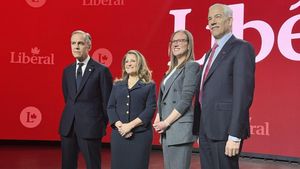The proposal to change the official name of Mexico has stirred considerable discussion, as Kenia López Rabadán, the Vice President of the Chamber of Deputies and member of the National Action Party (PAN), introduced the initiative to rename the country from "Estados Unidos Mexicanos" to simply "México." This move, announced on February 24, 2025, aims to bolster national identity and simplify official documentation by aligning the country’s name with common international usage.
López Rabadán stated, “Este cambio a México no altera nuestra forma de gobierno ni nuestro sistema federal. Lo que sí hace es fortalecer nuestra identidad nacional.” Her statements reflect the sentiment among many Mexicans who rarely use the full name. Instead, they typically refer to the country simply as "México," highlighting the disconnect between official nomenclature and everyday vernacular.
The importance of the name "México" transcends mere usage; it is steeped in historical and cultural significance. According to López Rabadán, the word originates from the Nahuatl language, deriving from “Metztli” which means moon, “Xictli” which means center, and “Co” which means place, translating to "in the navel of the moon.” This connection ties the name directly to Tenochtitlan, the Aztec capital located at the center of this cultural cradle.
López Rabadán elaborated on the historical variations of the country's name, indicating, “En la historia hemos sido llamados ‘República Mexicana’ en 1857, ‘Nación Mexicana’ en 1824, e incluso ‘América Mexicana’ en 1814, pero el nombre que realmente nos da identidad y arraigo es México.” This historical insight sets the stage for fundamental debates on national identity and nomenclature.
The initiative is not without precedent; it highlights the recurring dialogues surrounding the official name of the nation. Previous proposals have emerged over decades from various political factions, including notable support from former President Felipe Calderón. He and others have underscored the need to reflect Mexico’s self-identity both domestically and internationally.
This most recent proposal signifies not just a name change, but also poses questions about cultural representation and worthiness of the historical name. López Rabadán has positioned this change within the national discourse fittingly, pointing out, “La ONU y la OEA nos llaman México,” affirming how international organizations recognize the nation. Hence, she argues, it’s both practical and symbolic for Mexico to adopt this name officially.
If passed, the reform could lead to significant adjustments across various legal and institutional frameworks, including documentation, government forms, and other identifiers, reflecting this change uniformly across different sectors and governance levels. Yet, it should be noted, the proposal is framed carefully to alleviate fears about eroding federalism or altering governmental structures—a concern frequently voiced amid similar initiatives.
Given the contentious nature of national identity and the historical precedents set by other proposals, the path forward is far from straightforward. Discussions are likely to examine not only the name but also the underlying cultural narratives associated with it. Will the legislative efforts bear fruit this time, or will the discussion dissolve back again to the depths of political rhetoric?
The debate surrounding the proposed renaming has already captured the attention of various sectors within society and government. Advocates see it as an opportunity to unify the nation and reclaim its deep-rooted heritage by adopting the name widely embraced by its citizens.
Moving forward, Congress will need to deliberate whether this name modification can gain sufficient traction to proceed through the legislative process. It remains to be seen whether this initiative will be accepted or once more shelved alongside its predecessors.
For López Rabadán, the initiative encapsulates more than just semantics; it strives to consolidate identity in the face of globalization and reflects pride within the national fabric. Her proposal may well reignite the pride many feel about their homeland, returning to the heart of what it means to call oneself Mexican.



